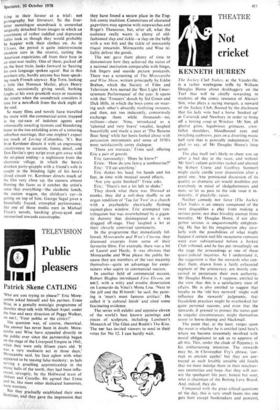TELEVISION
Public pleasers
Patrick Skene CATLING
'Who are you trying to please?' Eric More- cambe asked himself and his partner, Ernie Wise, in a genially nostalgic programme of showbiz shop-talk with Michael Aspel, under the free and easy direction of Peggy Walker, on Bac', 'Your public or the critics?'
The question was, of course, rhetorical. The answer has never been in doubt. More- cambe and Wise have appealed directly to the public ever since the partnership began on the stage of the Liverpool Empire in 1941, When they were only fifteen years old. 'It was a very mediotre act in those days,' Morecambe said, his face aglow with what appeared to be teasing false modesty: as lads serving a gruelling apprenticeship in the music halls of the north, they had been influ- enced, strangely, by the Hollwood team of Abbott and Costello. He agreed that Ernie and he, like most other dedicated humorists, were worriers. But they gradually established their own identities, and they gave the impression that
they have found a secure place in the Eng- lish comic tradition. Committees of ulcerated gagwriters may agonise with stopwatches and Roget's Thesaurus, but, after all, what the audience really wants is plenty of old- fashioned slap and tickle—a slap on the belly with a wet fish and the tickle of innocently risque innuendo. Morecambe and Wise re- liably deliver the goods.
The sac gave them plenty of time to demonstrate how they achieved the status of a national institution comparable with bingo, fish fingers and seaside picture postcards. There was a screening of The Morecambe and Wise Show, written principally by Eddie Braben, which the Society of Film and Television Arts named the 'Best Light Enter- tainment Performance' of the year. It opens with that 'Trousers' sketch by Sid Green and Dick Hills, in which the boys come on wear- ing each other's absurdly misfitting trousers, and then, not too indecently, contortively exchange them while thousands—no, millions—cheer. Nina, introduced as a 'talented and very brave' vocalist, laughed beautifully and made a pass at 'The Banana Boat Song' while her hosts fooled about with percussion instruments and some of 1970's most satisfactorily corny dialogue.
• 'These are maracas,' Ernie said, offering Eric a pair of gourds.
Eric (anxiously): 'Does he know?'
Ernie: 'How do you fancy a tambourine?' Eric: 'I'll eat anything.'
Eric shakes his head, his hands and his feet, in time with musical sound effects.
'Are you quite finished?' Ernie asks.
Eric: 'There's not a lot left to shake.'
They shook what there was. Dressed as monks, they did a soft-shoe shuffle to an organ rendition-of 'Tea for Two' in a church with a psychedelic electrically flashing stained-glass window. Eric attempted ven- triloquism but was overwhelmed by a gigan- tic dummy that disintegrated as it was dragged off-stage. They laughed a lot at their cleverly contrived spontaneity.
In the programme that immediately fol- lowed, Morecambe and Wise's Cinema, they discussed excerpts from some of their favourite films. For example, there was a bit of Laurel and Hardy. It was obvious that Morecambe and Wise please the public be- cause they are members of the vast majority themselves—quite an advantage for enter- tainers who aspire to commercial success.
In another field of commercial success, Robert Hughes introduced First Eleven, on ssc2, with a witty and erudite dissertation on Leonardo da Vinci's Mona Lisa. 'Next to the pill and the H-bomb,' he said the paint- ing is `man's most famous artifact.' He called it 'a cultural fetish' and cited some fascinating evidence.
The series will exhibit and appraise eleven of the world's best known paintings and pieces of sculpture, including Landseer's Monarch of The Glen and Rodin's The Kiss. The sac has invited viewers to send in their votes for No 12. I can hardly wait.






































 Previous page
Previous page